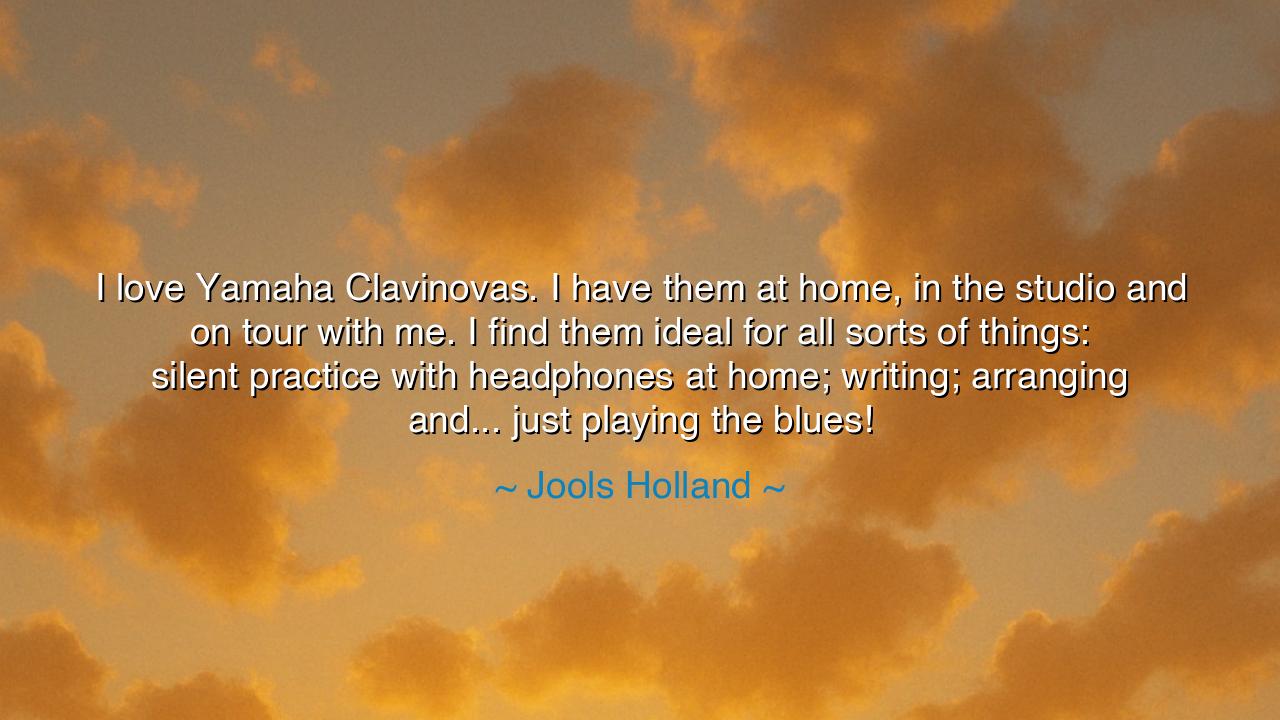
I love Yamaha Clavinovas. I have them at home, in the studio and
I love Yamaha Clavinovas. I have them at home, in the studio and on tour with me. I find them ideal for all sorts of things: silent practice with headphones at home; writing; arranging and... just playing the blues!






When Jools Holland said, “I love Yamaha Clavinovas. I have them at home, in the studio and on tour with me. I find them ideal for all sorts of things: silent practice with headphones at home; writing; arranging and... just playing the blues!”, he was not merely praising an instrument—he was revealing a philosophy of life. In his words, the Clavinova becomes more than wood and wire; it becomes a symbol of devotion to craft, of the artist’s eternal bond with creation. Beneath his admiration for this instrument lies the spirit of a musician who finds in music not only a profession, but a sacred rhythm through which he communes with the soul of the world.
The origin of this quote arises from Jools Holland’s lifelong relationship with the piano. A virtuoso of rhythm and blues, he is a man who has lived by melody and expression. His passion for the Yamaha Clavinova, a digital piano renowned for its versatility and tone, reflects his belief that art must be ever accessible—that creation should flow as easily at home as it does on stage. When he speaks of practicing “silently with headphones” or “just playing the blues,” he reminds us that artistry does not depend on grandeur or audience. The true artist carries his temple within; his worship is his daily practice, his prayer the sound of his fingertips upon the keys.
To love an instrument, as Jools does, is to love the act of creation itself. It is to understand that mastery is not a single achievement, but a living relationship between musician and music. The ancients spoke of such devotion in their crafts. Pythagoras, the philosopher who heard harmony in the movement of the stars, believed that all creation was music—that the soul of man resonated with the same frequencies as the cosmos. Holland’s affection for his Clavinova reflects this same reverence. For him, it is not merely a tool but a companion of the spirit, a bridge between inspiration and reality.
When he speaks of using it for “writing, arranging, and just playing the blues,” he reveals the many faces of creativity. The blues, born from sorrow and transformed into beauty, teaches that pain, when expressed through art, becomes power. The Clavinova, capable of both delicate whisper and thunderous joy, serves as his vessel for that transformation. It is as if Jools is saying: wherever life takes you—be it home, work, or journey—carry your art with you, and let it heal you. Like the bards of old who traveled with their lutes, he reminds us that true artistry knows no boundaries of place or time.
There is humility, too, in his words. Despite his fame, Jools finds joy in practice, in the quiet hours when no one watches. The great sculptor Michelangelo once said that even after decades of mastery, he was “still learning.” So too does Jools embody this ancient truth—that excellence is born not in applause but in repetition, in the patient refining of one’s gift. The Clavinova becomes a symbol of this timeless diligence—a reminder that passion requires discipline, and that even the most joyful art is built upon countless moments of devotion unseen by the world.
His mention of “silent practice with headphones at home” speaks to another kind of wisdom: that creativity must balance solitude and sharing. The ancients believed that solitude was the crucible of mastery. The poet Hesiod wrote that silence sharpens understanding, for in silence the mind listens more deeply. In that quiet space, Jools finds the freedom to experiment, to fail, to dream. The music born there, nurtured in solitude, is later carried into the light of the stage—proof that what we cultivate in private becomes the gift we offer to the world.
From his reflection emerges a lasting lesson: cherish your instrument, whatever it may be. For some, it is a piano; for others, a brush, a pen, or a voice. Your instrument is the bridge between your inner life and the outer world. Tend to it, practice with it, and let it accompany you through all stages of life. It need not be perfect—it need only be yours. The one who loves their craft sincerely, as Jools loves his music, will find peace in every note, joy in every practice, and purpose in every sound.
So let Jools Holland’s words remind us that art is not bound to circumstance or stage—it lives in the daily practice of the soul. Whether at home, in the studio, or on the road, the true artist carries creation like a flame within them, feeding it with patience, love, and play. And when that flame meets the world, even through the simple act of “just playing the blues,” it becomes something eternal—a harmony between man and the divine, sung through the humble keys of a piano.






AAdministratorAdministrator
Welcome, honored guests. Please leave a comment, we will respond soon